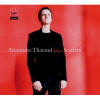Texte paru dans: / Appeared in:
*

GRAMOPHONE (04/2011)
Pour s'abonner /
Subscription information
Virgin
64201603

Code-barres
/
Barcode:
5099964201603
Reviewer:
Lindsay Kemp
A Baroque specialist pianist takes the logical step into the sonatas of Scarlatti
I swear that when I expressed a hope for some Scarlatti from Alexandre Tharaud at the end of my recent review of his reissued Bach, Rameau and Couperin recordings (Harmonia Mundi, 2/11), I did not know he already had a recital in the can for Virgin Classics. It is, of course, a logical next step for this Baroque loving pianist, even if the composer’s long history of successful transfers to the piano makes it harder for his originality to stand out; given its entry into a wide and varied field where some fiercely re-inventive beasts roam, it seems inevitable that Tharaud’s recording will make less impact than his uniquely original take on the clavecinistes. Which is not to say that it is without its share of individuality. Tharaud’s enthusiasm for the music, together with his alert imagination and precise interpretative skills, are enough to insure against that. The 18 sonatas here draw on some old favourites – the racy K29, the repeated-note orgy that is K141, the sublimely plaintive K208, for instance – but the result is far from routine. Tharaud commands an impressive range of timbres and articulations with a crisp technique which enables him to express melodic tenderness as tellingly as hard-edged brilliance and clarity. Highlights include rippling virtuosity in K472 and K29 (the latter a terrier-like performance with cross-hand notes pinging like yelps), a firmly shaped K430 falling just the right side of mannerism, and simple, natural and loving lyricism in K9 and (gloriously) K481; slightly less successful to my mind are an over-dreamy K8, and a K132 which lacks regal high-bearing. I might just give them all up, however, for the haunting depth and perspective of the opening of Tharaud’s K380, which (if I may come over all romantic for a moment) sounds for all the world like Pan enticing some Arcadian procession into being.
Cliquez l'un ou l'autre
bouton pour découvrir bien d'autres critiques de CD
Click either button for many other reviews


